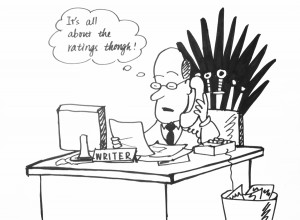TV shows should not use rape as a rating tool
It’s amazing anyone can avoid Game of Thrones coverage — from The New York Times and the Daily Beast to TV Guide and The New Republic, recaps of the show are too plentiful to ignore, even for non-viewers. If you are one of the few who has followed the series, however, be warned: spoilers follow.
For many, spoilers won’t matter as they have already seen Sunday’s episode, “Oathkeeper,” which garnered a series high of 6.9 million viewers. The spike in viewers — which topped the season four premiere — came after a very controversial episode, “Breaker of Chains,” which showcased everyone’s favorite incestuous couple, twins Jaime and Cersei Lannister, in a scene where Jaime rapes Cersei in front of their dead son.
Higher ratings are probably just what showrunners David Benioff and D.B. Weiss were hoping for when they wrote that episode. After all, the sexual encounter was not depicted as a rape in the book series.
Though there will always be a need to make changes when interpreting books for the screen — something that the Game of Thrones writers have done extremely well in streamlining author George R.R. Martin’s colossal novels — rape has become too common a tool used to increase viewership in television.
Earlier this year, Downton Abbey faced a similar problem. Not only was the rape of lady’s maid Anna completely out of place, it was also treated horribly in the show as the series focused on her husband, Bates, rather than her own recovery. More than anything, it appears that the show ran out of ideas and decided to throw in a good ol’ rape storyline to heat up viewership.
Game of Thrones is a completely different show, but one that has now committed a similar transgression. For those who don’t watch Game of Thrones — and, now knowing it involves a man’s rape of his twin, probably never want to — the rape scene isn’t as surprising as it might sound. The show has become a success partly because of its shock value. Protagonists are regularly killed off, mass slaughters occur at weddings and young girls murder old men with a vengeance.
But unlike most of these storylines, the rape didn’t happen in the book. In the corresponding novel in the series, A Storm of Swords, Cersei originally has some mild protestations to having sex in a holy place, but soon is just as willing as Jaime himself. Though Martin addressed the controversy on his blog, saying that the chapter is told from Jaime’s point of view, meaning “the reader is inside his head, hearing his thoughts,” and that the timeline has been changed in the show so that “the setting is the same, but neither character is in the same place as in the books.”
Despite the fact that both these points are true, having Jaime rape Cersei completely changes his character. Though he is a morally questionable person to begin with, it appears throughout the series that he is improving, or at least in some ways trying to. Having him rape his sister, however, destroys any progress he’s made and casts his character in a different light. Though part of the point of the show is that characters are not “good” or “bad,” but rather morally ambiguous, it appears as if the show’s writers almost wanted viewers to gloss over the rape as if it was no big deal, just another minor transgression Jaime has committed. This is further reinforced by the most recent episode, in which Jaime is once again painted as a hero who cares deeply for his brother. That plot is easy to buy in the book, however, the on-screen Jaime can no longer be seen as the character he previously was, forever ruining his chance at redemption.
But at least Benioff and Weiss got some extra viewers out of it.
Isabella Sayyah is a sophomore majoring in international relations and print and digital journalism. She is also the Associate Managing Editor of the Daily Trojan.


